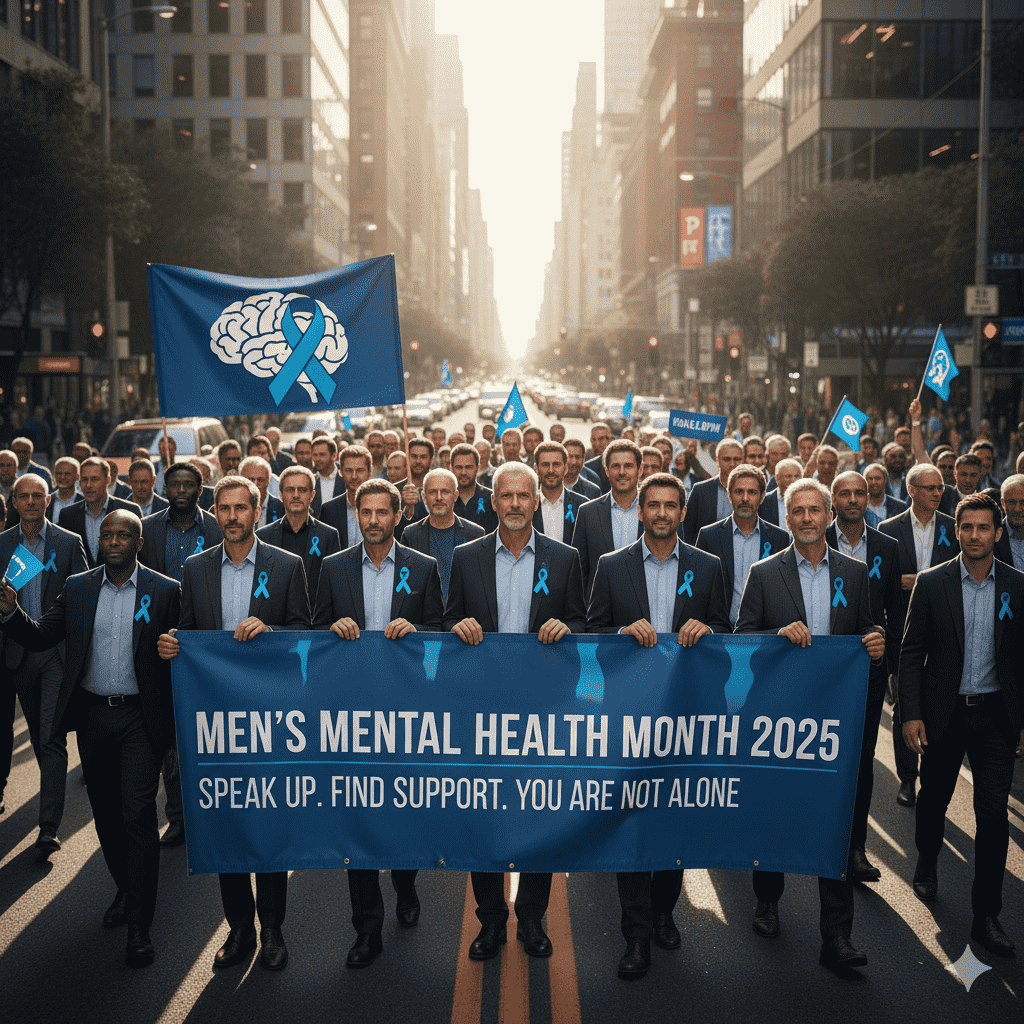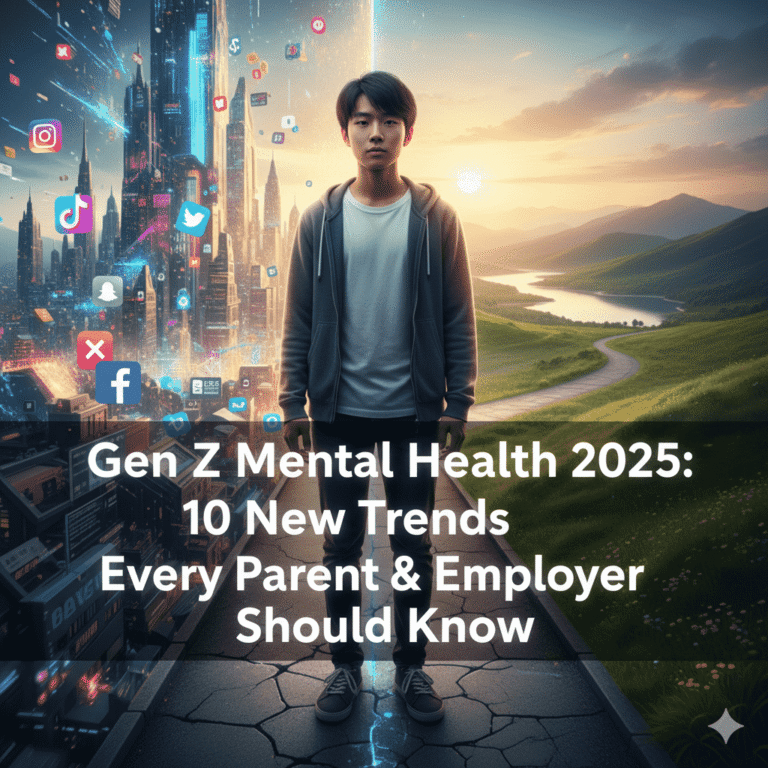
Every year, conversations around mental health gain momentum, but when it comes to men, the dialogue is often silenced by stigma and stereotypes. That is why Men’s Mental Health Month 2025 is more important than ever. It is not just another awareness campaign—it is a movement to highlight struggles, challenge societal expectations, and offer real solutions for men everywhere.
This in-depth guide will cover everything you need to know about Men’s Mental Health Month, including its history, importance, key issues men face today, and practical ways you can support mental well-being in your family, workplace, and community.
What Is Men’s Mental Health Month?
Men’s Mental Health Month is observed every June to raise awareness about the unique mental health challenges men face. It encourages open conversations, provides education, and promotes accessible resources for men struggling in silence.
While mental health awareness campaigns exist throughout the year, dedicating a month specifically to men ensures that their voices and issues are not overshadowed. This is crucial in 2025, as studies show men are still far less likely to seek professional help compared to women.
When Is Men’s Mental Health Month 2025?
If you are wondering, “what month is men’s mental health month 2025?”, the answer is June 2025. Throughout the month, global organizations, nonprofits, and community groups run events, workshops, and campaigns to challenge stigma and provide support to men in need.
From awareness walks and online webinars to celebrity campaigns, the focus remains on breaking stereotypes and spreading the message: it’s okay to talk about mental health.

Why Men’s Mental Health Awareness Matters
The importance of men’s mental health awareness cannot be overstated. Globally, men are disproportionately affected by certain mental health challenges:
- Higher rates of suicide among men compared to women.
- Cultural expectations to “be tough” or “hide emotions.”
- Reluctance to seek therapy or counseling due to stigma.
- Rising stress levels from financial pressure, career demands, and societal roles.
When men do not feel safe opening up, mental health struggles remain hidden—leading to tragic consequences for individuals, families, and communities.
The Current State of Men’s Mental Health in 2025
According to the latest men’s mental health statistics 2025, alarming trends persist:
- Suicide remains one of the leading causes of death among men under 45.
- Depression and anxiety are rising significantly among younger men (18–30).
- Work-related burnout affects men at nearly the same rate as women, but is less frequently reported.
- Social isolation, particularly after the COVID-19 pandemic, continues to impact men across generations.
Despite these challenges, awareness campaigns and initiatives are gaining ground. From online therapy platforms to men’s mental health support groups, resources are becoming more accessible worldwide.
Breaking the Stigma Around Men’s Mental Health
One of the central goals of Men’s Mental Health Month 2025 is to dismantle the stigma that keeps men silent. For decades, cultural narratives have told men to “man up” or suppress their feelings. This mindset can be deadly.
Why Stigma Persists:
- Fear of being judged as weak.
- Lack of representation in campaigns.
- Generational beliefs passed down in families.
- Fear of professional or social consequences.
Encouraging open conversations in schools, workplaces, and communities is essential to shifting this culture.
Key Issues Men Face in 2025
Men’s mental health challenges are not one-size-fits-all. Some of the most pressing issues today include:
1. Depression and Anxiety
Stress from careers, relationships, and financial pressures are driving a surge in cases of depression and anxiety among men.
2. Substance Abuse
Alcohol and drug use are often coping mechanisms for unresolved mental health struggles, making recovery even more complex.
3. Social Isolation
With digital lifestyles, remote work, and declining community participation, many men report feelings of loneliness.
4. Suicide Risk
Globally, men are nearly four times more likely to die by suicide than women, underlining the urgent need for prevention strategies.
How to Support Men’s Mental Health
You don’t need to be a professional therapist to make a difference in a man’s life. Supporting mental health can start with small but impactful actions.
Practical Ways to Help:
- Listen without judgment when a man opens up.
- Encourage professional help, such as therapy or counseling.
- Normalize emotional expression within families and friendships.
- Share resources like hotlines, online therapy, or community groups.
- Be present—sometimes, consistent support is more powerful than advice.

Men’s Mental Health Initiatives in 2025
Awareness is only one part of the solution. Action matters too. In 2025, many initiatives are leading the way in supporting men’s well-being:
- Workplace Programs: More companies are offering flexible hours, stress management workshops, and access to counseling services.
- Celebrity Advocacy: Public figures like athletes and entertainers are openly discussing their struggles, helping normalize the conversation.
- Online Counseling Platforms: Virtual therapy is breaking barriers for men who fear judgment in face-to-face settings.
- Community Groups: Local organizations host meetups, providing safe spaces for men to connect and share.
How to Raise Awareness During Men’s Mental Health Month
If you want to contribute during Men’s Mental Health Month 2025, there are countless ways to get involved.
Awareness Ideas
- Host or attend local awareness events.
- Share accurate resources on social media.
- Wear ribbons or symbols supporting men’s mental health.
- Encourage discussions at your workplace or school.
- Donate to organizations focused on men’s mental well-being.
These actions may seem small, but collectively they create cultural change.
Role of Families and Relationships
Family and friends play a significant role in promoting men’s mental health support. Fathers, brothers, and partners need safe spaces to share struggles without judgment. Encouraging therapy and maintaining open communication at home are crucial steps toward breaking cycles of silence.
The Workplace and Men’s Mental Health
With most men spending a significant part of their lives at work, workplaces must prioritize well-being. Employers can promote mental health by offering counseling benefits, reducing burnout culture, and creating policies that value work-life balance.
Workplace Strategies
- Provide confidential access to mental health resources.
- Train managers to recognize signs of burnout.
- Normalize taking mental health days.
- Create peer support groups for employees.
These efforts not only improve mental health but also boost productivity and loyalty.
Resources for Men’s Mental Health
If you or someone you know is struggling, there are many resources available:
- National Suicide Prevention Lifeline (U.S.) – 988
- Mind (U.K.) – Support for mental health challenges
- Movember Foundation – Focused on men’s mental health and suicide prevention
- Online Counseling Platforms – Accessible therapy sessions from anywhere in the world
Looking Ahead: A Future Without Stigma
The ultimate goal of Men’s Mental Health Month 2025 is to create a society where men feel empowered to speak up and seek help without fear. By raising awareness, breaking stigma, and promoting resources, we can build a healthier future for men everywhere.

Conclusion
Men’s Mental Health Month 2025 is more than a date on the calendar—it is a reminder that men’s struggles are real, urgent, and deserving of attention. By recognizing the importance of awareness, supporting initiatives, and taking personal steps to help, we can ensure that no man suffers in silence.
knee surgery meme
When is Men’s Mental Health Month 2025?
It will be observed in June 2025 with events, campaigns, and initiatives worldwide.
Why is men’s mental health important?
Men face higher rates of suicide, stigma, and social pressures that affect their mental well-being, making awareness and support crucial.
How can I support men’s mental health?
You can listen without judgment, encourage professional help, share resources, and promote open conversations at home, work, and in the community.
What initiatives exist for men’s mental health in 2025?
Workplace programs, celebrity advocacy, online counseling, and community groups are leading efforts to support men’s mental well-being.


